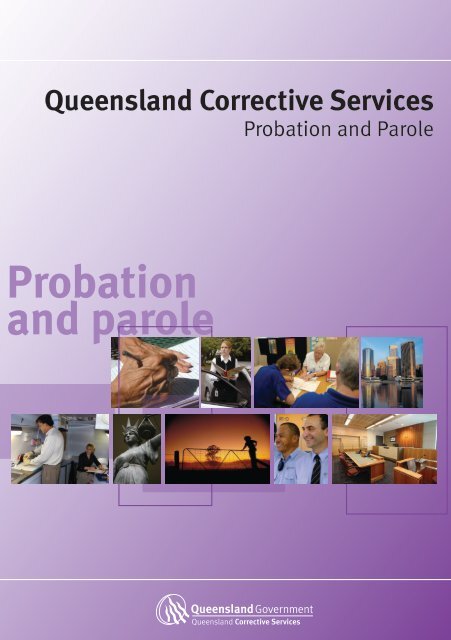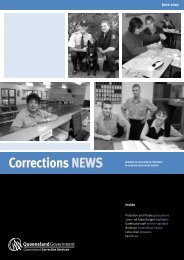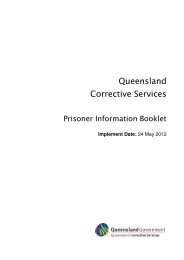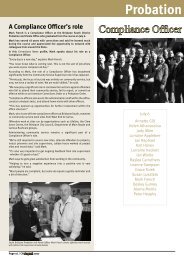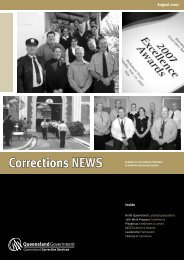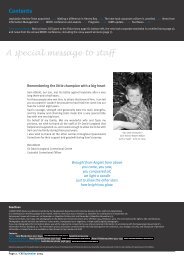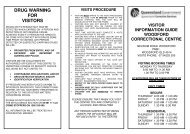Probation and parole - Queensland Corrective Services
Probation and parole - Queensland Corrective Services
Probation and parole - Queensland Corrective Services
Create successful ePaper yourself
Turn your PDF publications into a flip-book with our unique Google optimized e-Paper software.
Queensl<strong>and</strong> <strong>Corrective</strong> <strong>Services</strong><br />
<strong>Probation</strong> <strong>and</strong> Parole<br />
<strong>Probation</strong><br />
<strong>and</strong> <strong>parole</strong>
2 <strong>Probation</strong> <strong>and</strong> Parole Service<br />
Queensl<strong>and</strong> <strong>Corrective</strong> <strong>Services</strong><br />
Queensl<strong>and</strong> <strong>Corrective</strong> <strong>Services</strong> <strong>Probation</strong> <strong>and</strong> Parole was introduced in August 2006<br />
<strong>and</strong> focuses on the tough supervision <strong>and</strong> surveillance of offenders, creating strong<br />
links with the courts <strong>and</strong> the judiciary, <strong>and</strong> delivering a suite of major rehabilitation <strong>and</strong><br />
intervention programs.<br />
The role of <strong>Probation</strong> <strong>and</strong> Parole is to:<br />
assist courts <strong>and</strong> Parole Boards to assess whether offenders are suitable for<br />
community-based orders<br />
enforce the conditions of court <strong>and</strong> Parole Board orders<br />
protect the community by assisting offenders to successfully complete their<br />
orders<br />
Parole <strong>and</strong> other orders<br />
As part of changes introduced under the <strong>Corrective</strong> <strong>Services</strong> Act 2006, <strong>parole</strong> is the only<br />
form of early release available to all prisoners. Under the new legislation, prisoners<br />
serve the entire sentence h<strong>and</strong>ed down by a court, either in custody or on <strong>parole</strong> in the<br />
community.<br />
Prisoners sentenced to three years or less imprisonment (except sex offenders <strong>and</strong><br />
serious violent offenders) are given a <strong>parole</strong> release date by the sentencing court.<br />
Prisoners who have been convicted of sex offences or serious violent offences or who<br />
are sentenced to more than three years in jail must apply to a Parole Board for release to<br />
<strong>parole</strong>.<br />
Prisoners on <strong>parole</strong> remain under the supervision of Queensl<strong>and</strong> <strong>Corrective</strong> <strong>Services</strong><br />
until the end of their sentence. Parolees are subject to certain conditions; for example,<br />
they must report regularly to their <strong>Probation</strong> <strong>and</strong> Parole Office, attend rehabilitation<br />
programs, undergo drug testing <strong>and</strong> abstain from alcohol. Specific conditions relating to<br />
employment, curfew or a place of residence may also be applied.<br />
Offenders serving their sentences in the community can be placed on:<br />
probation<br />
intensive correction orders<br />
prison/probation orders<br />
community service orders<br />
drug rehabilitation order<br />
Offenders on such orders are subject to supervision by a <strong>Probation</strong> <strong>and</strong> Parole Officer,<br />
<strong>and</strong> may also be required to attend rehabilitation programs or counselling, <strong>and</strong> perform<br />
community service. Offenders on an intervention order who fail to comply are returned<br />
to court for breach action.
Regional structure<br />
Queensl<strong>and</strong> <strong>Corrective</strong> <strong>Services</strong><br />
<strong>Probation</strong> <strong>and</strong> Parole is structured into eight regions with a regional manager<br />
responsible for managing the District Office in which they are based.<br />
<strong>Probation</strong> <strong>and</strong> <strong>parole</strong> services are delivered through 34 district offices <strong>and</strong> over 100<br />
reporting centres. Reporting centres enable offenders to be supervised by <strong>Probation</strong> <strong>and</strong><br />
Parole officers in the community in which they live.<br />
<strong>Probation</strong> <strong>and</strong> Parole Service<br />
3
<strong>Probation</strong> <strong>and</strong> Parole staff<br />
Under <strong>Probation</strong> <strong>and</strong> Parole, staff are divided into five distinct groups professional<br />
staff, intelligence positions, programs staff, support staff <strong>and</strong> court services staff.<br />
The previous Community Corrections model merged assessment, case management,<br />
compliance <strong>and</strong> intervention functions into the role of one Community Corrections<br />
Officer (CCO). This resulted in conflicting functions for CCOs.<br />
Roles for <strong>Probation</strong> <strong>and</strong> Parole Officers are now specialised to reduce the complexity of<br />
an officer s responsibilities, <strong>and</strong> improve efficiency, transparency <strong>and</strong> accountability.<br />
Assessment officers<br />
Specialist assessment staff conduct assessments <strong>and</strong> establish a management<br />
plan for each offender based on their reoffending risk <strong>and</strong> individual needs.<br />
These offenders management plans may include a range of activities <strong>and</strong><br />
conditions including program referral, individual counselling with external<br />
providers, compliance with drug testing regimes or employment preparation <strong>and</strong><br />
assistance.<br />
Case management officers<br />
Case management officers are <strong>Probation</strong> <strong>and</strong> Parole s most experienced officers<br />
who focus on helping high risk offenders to develop the skills required to<br />
successfully complete their order <strong>and</strong> to prevent re-offending. Case management<br />
officers work closely with corrective services intelligence officers, local police<br />
<strong>and</strong> community organisations <strong>and</strong> agencies.<br />
Reporting officers<br />
Reporting officers are responsible for the ongoing monitoring <strong>and</strong> supervision of<br />
low to medium risk offenders. They work closely with community agencies <strong>and</strong><br />
are responsible for implementing the offender s management plan <strong>and</strong> ensuring<br />
offenders comply with their orders.<br />
Compliance <strong>and</strong> surveillance officers<br />
Compliance officers are responsible for the preparation of court briefs <strong>and</strong><br />
associated documents following the contravention of court orders. They ensure<br />
contraventions of orders are brought before the court quickly <strong>and</strong> efficiently, <strong>and</strong><br />
that warrants are issued for those offenders who abscond from supervision. This<br />
role also involves supervising offenders on community service orders.<br />
Surveillance officers are responsible for ensuring offenders are complying<br />
with the terms of their orders. They are involved in activities such as breath<br />
<strong>and</strong> urinalysis testing, ensuring high risk offenders adhere to curfews <strong>and</strong><br />
determining whether offenders are providing accurate personal details.<br />
4 <strong>Probation</strong> <strong>and</strong> Parole Service<br />
Queensl<strong>and</strong> <strong>Corrective</strong> <strong>Services</strong>
Intelligence staff<br />
Intelligence staff compliment <strong>Probation</strong> <strong>and</strong> Parole s increased surveillance capacity.<br />
Their role is to accurately inform management about higher risk offenders who are being<br />
supervised in the community.<br />
Intelligence advisors develop, coordinate <strong>and</strong> supervise intelligence plans, <strong>and</strong> provide<br />
QCS Intelligence <strong>and</strong> Investigations Division with information to help reduce risk to the<br />
community.<br />
These intelligence plans are analysed <strong>and</strong> monitored by intelligence analysts who are<br />
located in key <strong>Probation</strong> <strong>and</strong> Parole offices across the State.<br />
Support staff<br />
The administrative, administration <strong>and</strong> business system functions of each <strong>Probation</strong><br />
<strong>and</strong> Parole Office are carried out by a range of support staff.<br />
Court services<br />
Under <strong>Probation</strong> <strong>and</strong> Parole, the former Court Advisory Service will be replaced with<br />
professional prosecutors in each of the <strong>Probation</strong> <strong>and</strong> Parole regions.<br />
A new Judicial Liaison Unit will provide consistent <strong>and</strong> st<strong>and</strong>ardised information to<br />
courts, regional managers <strong>and</strong> district managers.<br />
Programs staff<br />
Queensl<strong>and</strong> <strong>Corrective</strong> <strong>Services</strong><br />
Intervention programs are delivered to offenders on court-orders across the State<br />
through a network of eight dedicated programs hubs.<br />
While working with <strong>Probation</strong> <strong>and</strong> Parole, the program staff in these hubs are part of<br />
QCS Offender Programs <strong>and</strong> <strong>Services</strong> Directorate to ensure a higher quality of practice<br />
<strong>and</strong> supervision in their specialised roles.<br />
Programs staff include regional coordinators who establish <strong>and</strong> manage the program<br />
hubs, <strong>and</strong> work in collaboration with <strong>Probation</strong> <strong>and</strong> Parole regional managers, district<br />
managers <strong>and</strong> operational staff. Intervention programs are delivered to offenders by<br />
program facilitators.<br />
<strong>Probation</strong> <strong>and</strong> Parole Service<br />
5
Community service<br />
As part of their court orders, offenders may be sentenced to undertake community<br />
service under the supervision of <strong>Probation</strong> <strong>and</strong> Parole.<br />
Community service projects are operated by not-for-profit community organisations.<br />
They include environmental groups, schools, ambulance services, charities, mealson-wheels,<br />
sporting clubs, local councils <strong>and</strong> many other organisations. Voluntary<br />
supervisors oversee the offenders working on the projects.<br />
Offenders work one or two days a week <strong>and</strong>, for many, it is their first experience<br />
of community work. Some offenders continue this work voluntarily following the<br />
completion of their orders.<br />
Intervention programs<br />
Offenders on probation <strong>and</strong> <strong>parole</strong> orders have access to a range of programs <strong>and</strong><br />
interventions aimed at lowering their risk of re-offending.<br />
These programs, offered through the eight program hubs, assist offenders to confront<br />
their criminal behaviour, <strong>and</strong> develop pro-social skills <strong>and</strong> techniques to control their<br />
behaviour <strong>and</strong> avoid situations that may lead to further offending.<br />
These programs include:<br />
The Turning Point: Preparatory Program, which helps offenders prepare to change<br />
their offending behaviour. The program helps offenders to weigh up the pros <strong>and</strong><br />
cons of changing their behaviour, <strong>and</strong> to help them to become more confident<br />
about their ability to make positive changes in their lives<br />
the Getting SMART: Moderate intensity substance abuse program that teaches<br />
offenders to use cognitive behavioural therapy (CBT) principles, theories, tools<br />
<strong>and</strong> techniques to abstain from any type of addictive behaviour<br />
the Making Choices program that addresses general offending behaviour <strong>and</strong><br />
helps participants to look at how they came to offend while also helping them<br />
to recognise points where different choices could be made. There are different<br />
versions of this program developed for male <strong>and</strong> female offenders<br />
the Ending Family Violence program that tackles violence within Indigenous<br />
families <strong>and</strong> aims to develop culturally-appropriate solutions to protect adults<br />
<strong>and</strong> children from the effects of domestic violence<br />
the Ending Offending program that is designed to meet the needs of Aboriginal<br />
<strong>and</strong> Torres Strait Isl<strong>and</strong>er offenders in a culturally appropriate manner. The<br />
overall aim of this program is to modify the drinking <strong>and</strong> offending behaviour of<br />
indigenous offenders in the correctional system.<br />
6 <strong>Probation</strong> <strong>and</strong> Parole Service<br />
Queensl<strong>and</strong> <strong>Corrective</strong> <strong>Services</strong>
Lower Gulf <strong>and</strong> Torres Strait<br />
As part of <strong>Probation</strong> <strong>and</strong> Parole, Gulf <strong>and</strong> Torres Strait Isl<strong>and</strong> communities are benefiting<br />
from tougher surveillance of offenders <strong>and</strong> state-of-the-art rehabilitation programs.<br />
A trial of the new probation <strong>and</strong> <strong>parole</strong> model was introduced in Doomadgee,<br />
Mornington Isl<strong>and</strong>, Normanton <strong>and</strong> Thursday Isl<strong>and</strong> in June 2006.<br />
For the first time permanent <strong>Probation</strong> <strong>and</strong> Parole offices are being established in<br />
the lower Gulf <strong>and</strong> Torres Strait to provide a higher level of supervision <strong>and</strong> case<br />
management of offenders under community-based orders.<br />
The <strong>Probation</strong> <strong>and</strong> Parole model for the lower Gulf <strong>and</strong> Torres Strait region aims to<br />
reduce the over-representation of Indigenous people in Queensl<strong>and</strong> s corrective<br />
services system. The improved supervision <strong>and</strong> access to rehabilitation programs is<br />
designed to provide a real sentencing alternative for judges <strong>and</strong> magistrates.<br />
<strong>Probation</strong> <strong>and</strong> Parole district offices<br />
<strong>Probation</strong> <strong>and</strong> Parole district offices are located at:<br />
Beenleigh<br />
Brisbane Central<br />
Brisbane North<br />
Brisbane South<br />
Bundaberg<br />
Burleigh Heads<br />
Caboolture<br />
Cairns<br />
Clevel<strong>and</strong><br />
Emerald<br />
Gladstone<br />
Gympie<br />
Hervey Bay<br />
Inala<br />
Innisfail<br />
Ipswich<br />
Kingaroy<br />
Queensl<strong>and</strong> <strong>Corrective</strong> <strong>Services</strong><br />
Logan City<br />
Mackay<br />
Mareeba<br />
Maroochydore<br />
Mt Gravatt<br />
Mt Isa<br />
Noosa Heads<br />
Pine Rivers<br />
Redcliffe<br />
Rockhampton<br />
Roma<br />
Southport<br />
Thuringowa<br />
Thursday Isl<strong>and</strong><br />
Toowoomba<br />
Townsville<br />
Wynnum<br />
For contact details, contact Queensl<strong>and</strong> <strong>Corrective</strong> <strong>Services</strong> on 3227 7111 or visit our<br />
website at www.correctiveservices.qld.gov.au<br />
<strong>Probation</strong> <strong>and</strong> Parole Service<br />
7
8 <strong>Probation</strong> <strong>and</strong> Parole Service<br />
Queensl<strong>and</strong> <strong>Corrective</strong> <strong>Services</strong><br />
GPO Box 1054<br />
Brisbane, Qld 4001<br />
For further publications on Queensl<strong>and</strong> <strong>Corrective</strong> <strong>Services</strong>,<br />
visit our website at<br />
www.correctiveservices.qld.gov.au


